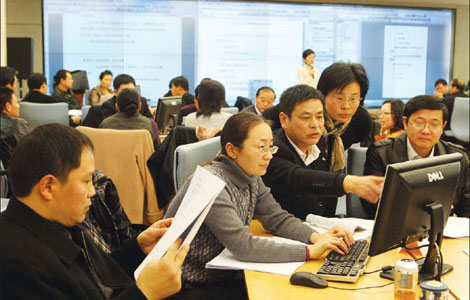Crisis management
Updated: 2011-03-11 10:56
By Wang Yan (China Daily European Weekly)
 |
|
Government officials from Dafeng, Jiangsu province, attend a crisis management course at the China Executive Leadership Academy Pudong in Shanghai. Gao Erqiang / China Daily |
Quick response, media interaction becoming essential in many training programs amid changing times
As 56 government officials from the city of Dafeng in Jiangsu province sat for a government training class in Shanghai, normal administrative work gave way to lectures. Officials morphed into attentive students, listening with curiosity as Professor Li Min began her crisis management session at the China Executive Leadership Academy Pudong (CELAP).
"China has entered an era where emergency incidents stack up. Dealing with emergencies is like solving math problems. No matter how many you've solved, the next is always a new one," Li says.
The class, designed for officials across the country, is like any other class in most universities in China and is part of the reform plan issued in August by the central government to properly train its cadres. The plan calls for institutes, including leadership academies, governance academies and party schools, across the country to refresh their training programs in terms of ideas and content.
One of the goals of the central government's plan is to train cadres to effectively solve problems because cadres - according to the central government - "lack focus and timeliness; training institutions are not open or competitive enough; and trainees lack self-motivation or the right attitudes."
But in recent years, institutes to train government officials have opened new courses to help them adapt to the fast-changing Chinese society.
"It's important that training materials are up to date. Chinese society is changing so fast that cases from 30 years ago would not work anymore," says Feng Jun, executive vice-president of CELAP.
One of the classes involves crisis management, fast becoming a must-learn topic in many training programs. In her class, professor Li broke the ice to the three-hour course with a small welcome speech. Soon afterward, she put the students into group discussions on specific cases.
"A large number of workers gather around their factory for labor disputes. What would you do if you were the mayor?" Li asks the officials.
Loud Dafeng dialects then filled the classroom. Twenty minutes later, representatives from each of the six groups explained their reaction plans.
Cao Jiageng, who works in Dafeng's organization department, was in the third group. His group decided that the city's mayor should arrive on the scene as soon as possible to have a face-to-face talk with protesting workers. Officials should also ask company executives about the dispute immediately. They suggested that in the shortest time possible, a news conference should be held to inform the public about how things are being solved to prevent any rumors from flying around the city.
Li gave an affirmative response to the plan and she reminded students to pay attention in protecting key infrastructures as crowds gather.
"Our goal is to transform students' ideas from an 'almighty' government to a service type," says the 37-year-old Li.
CELAP hosts a training innovation and case study center. It also has seven highly accomplished professors travel around the country to collect cases of government disputes or problems.
The task of teaching officials, Li says, is not an easy one. She says that at first she felt nervous when she came face-to-face with high-ranking officials. Carrying on the discussion-oriented class at the right pace requires lots of thought and homework, she explains.
She and other professors had to study the names of officials and decide how to divide them into groups to induce the most efficient discussions.
"We would put people with the similar job functions into a same group, so that each group could hear different sides of a story during the discussion. That helps them to think from another angle," she says.
The best part of the job, Li says, was when her students called and told her an emergency incident was solved after they got back to work.
Feng says the academy believes that the training should help officials fulfill their daily work needs. Crisis management courses, he says, are vital.
"China is transforming. We have pulled through a 200-year history of the Western world in just 30 years. It means we have to solve all kinds of social problems within such a short period. It's huge pressure. Improper handlings could lead to social breakouts," he says.
The crisis management course is also gaining popularity at other schools.
Li Xuefeng, professor at the National Institute of Emergency Management, which is associated with the Chinese Academy of Governance in Beijing, says his institute is expanding from offering two courses on crisis management to seven this year.
He says before the institute was founded in 2010, trial crisis management courses had appeared in the academy's normal cadre training programs. "(It was) not long after the 2003 SARS cover-up."
"Besides crisis management class, another aspect that's never too much for the students is learning how to communicate with the media."
Feng at CELAP agrees. His academy was actually the first in the country to open media communication courses. In 2009, CELAP built the first media simulation laboratory, which has since been recognized as an effective training ground for officials. CELAP's lab was divided into two parts: One simulating an exclusive interview room and the other simulating a news conference room.
Qin Chang, a host at Shanghai Radio, was recently an invited lecturer for the CELAP lab. In a December class, her students were officials from a tax bureau in Guangzhou.
"I know you guys, as the tax people, do not face the media very much. But I am letting you know that you won't be hiding from that for long," Qin says at the start of that lecture.
During the class, she quizzed them with a hypothetical question: "Why are taxes so heavy?" Many of the interviewees failed to answer most of Qin's fierce follow-up questions.
"I was being tougher than normal. But the idea I hope to pass along is that you have to understand the party you're talking with well enough to achieve effective communication," she tells the students.
She also says that when communicating with the public, simply considering how to keep one's position safe is not an expected reaction.
"As we enter the Internet era, one cannot assume that others will never know things he or she doesn't say, or they will never question what one says. In today's media environment, officials have to change some old thoughts," she says.
Feng says communicating with the media is a basic necessity for officials.
"How could one really understand the public without deeply knowing the media?" he says.
Cadre training dates back to the founding of the Communist Party of China (CPC). The oldest training institution, Party school of the Central Committee of the CPC, has a history of more than 70 years.
In the mid-1990s, the National Academy of Governance was established. In 2005, three leadership academies were founded in Shanghai, Jinggangshan and Yan'an. Different training institutes were also founded on the provincial and city levels.
The country put the Emergency Response Law into effect in November 2007, stipulating regular training for officials in charge of emergency management. In the following years, crisis management has been compulsory in the academy's regular training programs.
"The key is to keep the content up to date," says Zhang Tingyin, an economics professor with the Party School of the Henan Committee of the CPC who has been teaching there for over 20 years. "When planning a new semester, we follow the direction that things we teach in class have something to do with the latest policies."
In recent years, the country's cadre training system has been striving to be more open to the public. Just ahead of the 89th anniversary of the founding of the CPC last year, the central Party school opened its doors to more than 60 reporters, including 42 from 24 overseas media organizations. In the ensuing months, several local Party schools held open media sessions.
Both Feng and Li Xuefeng say their institutes are looking to teach officials on how to communicate internationally through exchange programs and inviting foreign lecturers.
Feng says CELAP has now trained 1,600 persons from 60 countries, including Australia, Canada as well as countries from the European Union.
"About 12 percent of our current lecturers are from foreign countries," he says. Foreign lecturers are usually invited for topics such as economic management, public administration, environment and ecology.
"People's mindsets have changed with the times, and old administrative practices no longer fit. Our goal is that what is taught here can turn into actions when one goes back," Feng says.
E-paper

Rise and shine
The Chinese solar energy industry is heating up following recent setbacks in the nuclear sector
Bombs aim for regime change
CSI, with a twist
Literary path
Specials

Peony express
Growers of china's unofficial national flower are reaching out to europe for help

Tea-ing up
More turning to Chinese tea for investment opportunities like vintage wine

A cut above
The ancient city of Luoyang is home to a treasure trove of cultural wonders.
